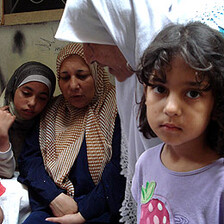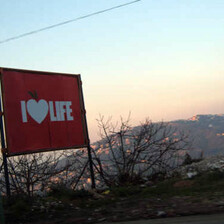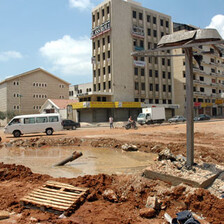Shatila Camp, Beirut 14 July 2006
It was a long night in the city… A night that started with a rumor on Al-Jazeera TV that Hizbullah’s missiles had hit Haifa, a rumor denied immediately denied by the resistance. We knew then that the Israelis were gearing up for a violent night, and that they were trying to send the message that they were in a state of defense, responding to a Hizb offence.
We stayed glued on the TV, listening to dozens of incoming news bulletins…
It was past midnight when we decided to sleep, an act of defiance to one of the Israeli ministers who appeared on Al-Jazeera to threaten that Beirutis won’t sleep while the people in the north of Israel are scared in their shelters.
My brother said: “If our sleep is bothering them so much, then let’s go to bed to spite them all!”
A couple of hours later, however, we woke up to the sound of shelling…we ran to the TV room and learned that Israel had blasted Mouawwad market in Ash-Shayah, in Southern Beirut.
We turned off the TV and went to bed again.
At 4:00 AM, we woke up again because of loud sounds, and again we ran to the TV room, this time to learn that the airport highway was destroyed. We remained glued to the TV until the power cut off around seven in the morning.
At about 8:30 AM, I went to get batteries to get the radio working. I roamed all the grocery stores in our neighborhood, but there were no batteries. The stores were out of batteries, and candles, too!
Since there was no power and I couldn’t be glued all day to the news, I decided to go to Shatila [refugee camp]. The city was almost empty; there were few cars in the streets and few open shops. The cab dropped me at the Sabra area, the “poor souk” as they call it in Beirut, which was bustling with people buying food supplies. All shops were packed except for the butcher and poultry shops, which stood empty. “Meat dishes are a luxury for the poor during normal times, so what do you say about war time?” as one of the butchers observed.
I started to hear the news coming out from the alleys from the outskirts of the camp, as I entered the maze of alleys. I saw people gathering around TV sets and following the news moment by moment. As I walked on a few minutes, I heard whoops, clapping and shouts: “God is great! God is great! Hit them! hit them badly!”
Whenever a Hizbullah missile is dropped on Israel, the residents of Shatila rejoice.
I kept on walking and passing by small gathering of people gathering around TV sets. National Music also filled the alleys, with people singing…Marcel Khalife, Ahmad Kaabour, Sheikh Imam and the Palestinian `Ashiqeen group, singing the songs of the 1982 siege of Beirut.
“Listening to these songs feels different at this moment, I haven’t felt them in a while, they are giving me goose bumps now, they are making me tearful, I feel something in my heart when I hear songs about the south now, and about resistance” one of the youths in Shatila said…
“Beirut has a different taste to it now, it’s the Beirut we knew, the Beirut of resistance not the Beirut of shopping and tourism,” one of the older fighters said.
Shatila, as ever seems in a state of waiting. I sat to watch TV with one of the gathered groups. We lost power in my neighborhood early this morning. It feels surreal to come to Shatila to get connected to the world. The Lebanese complaints about power cuts and water shortages and even food shortages won’t change the course of life in Shatila, which in normal times has no access to water and power service from the Lebanese government. The Camp has its own power generator, which will work as long as there is fuel to run it.
“And the food, well, we do not have much money to buy food and store goods,” Usama said, smiling. “We are always on a diet in Lebanon!”
Behind the scenes of happiness and hope, fears and concerns of raids on the camp are under the surface. “The children could not sleep all night, they kept screaming after Israel hit the airport road, just above the camp” Umm Usama says.
“I do not care about us, we lived the war, we know, but what crime did these children commit that they cannot to sleep, and have to live in fear, to scream after every shelling? she asked.
“Aren’t you scared?” I asked.
“Me? No — scared for what? What is it there left to us to be fearful about? We live here only because of lack of death as you know, it is better to die because of Israeli raids, than from sickness because we have no access to hospitals, or from poverty caused by the siege from the Lebanese government…” she answered.
Many of Shatila residents who have families outside of the camp left to stay with them. Farah told me her two aunts left to `Akkar in the north of Lebanon, “where they have family…and the Syrians also left. Only the people who have nowhere to go stayed. Inshallah nothing will happen.”
The whole time I was in Shatila, with every reported missile strike on Israel, screams and trills of joy and triumph fill the alleys of the camp. People in Shatila are feeling hopeful and scared at the same time. Hopeful for a defeat of Israel, but scared of nasty air strikes on the camp, a camp that was destroyed and rebuilt many times. But it is still there, and its residents are still hopeful to return to Palestine.
Related Links
Mayssoun Sukarieh is writing from her hometown of Beirut. On July 15th, Israel hit the outskirts of the camp with missiles, on the side where the Sabra and Shatila cemetary is found.





